- Overview
- Specializations
- Online Adult Gerontology – Primary Care Nurse Practitioner (AGPCNP) Program
- Adult Gerontology Acute Care Nurse Practitioner (AGACNP)
- Online Pediatric Nurse Practitioner (PNP) Program
- Online Family Nurse Practitioner (FNP)
- Online Psychiatric Mental Health Nurse Practitioner Program (PMHNP)
- Online Women’s Health Nurse Practitioner Program (WHNP)
- Program Details
- Careers
- Curriculum
- Admission Requirements
- University Details
- Faculty
- FAQs
- Resources
- Tuition and Fees
Adult Gerontology – Primary Care Nurse Practitioner (AGPCNP)
Overview
The Adult Gerontology – Primary Care Nurse Practitioner (AGPCNP), formerly known as an “AGNP”, specializes in providing comprehensive health care that extends across a patient’s lifespan, starting from adolescence to old age. With Regis College’s online AGPCNP-focused Master of Science in Nursing program, you can join this in-demand specialization, gain an intimate understanding of the aging process and work closely with patients to increase their quality of life at varying stages of maturity.
- What can you do with an advanced nursing degree in adult gerontology – primary care?
- Where do adult gerontology – primary care nurse practitioners work?
You may be eligible for a one-time Rise at Regis credit, valued at $1,025, if you start your journey this summer. There’s a 6-credit enrollment requirement.
Calendar
Application Deadline:
March 30, 2026
Upcoming Start Date:
May 4, 2026
Why Choose Regis for Your Online MSN in AGPCNP?





A Virtual Extension of Our Highly Regarded On-Campus Program
The online MSN is a virtual extension of our highly regarded on-campus program, one of the largest nurse practitioner programs in Massachusetts. The Regis School of Nursing was the first in New England to be designated a Center of Excellence in Nursing Education and is accredited by the Accreditation Council for Education in Nursing.
At Regis, we work directly with active nursing professionals. That means we have an insider’s perspective on the leadership qualities the field demands, and we design our courses to build those skills. Our MSN AGPCNP* specialty is designed to help you promote lasting change in the nursing field by providing adults and senior citizens the care and knowledge they need to lead healthy lifestyles.
Hear From Our Students

Benefits of Pursuing an Online MSN in AGPCNP
At Regis, we aim to break down barriers that can keep health care professionals from reaching their full potential in advanced nursing practice. With the same educational standards and curriculum as our highly regarded on-campus program, our online MSN has the added benefit of flexibility. For busy students and health care professionals, we know that counts for a lot.
As part of our inclusive approach to nursing education, we also offer three entry points to our MSN AGPCNP program, allowing us to meet learners where they are in their academic journey:
- Associate Degree in Nursing to MSN
- Non-Nursing Bachelor’s to MSN
- Bachelor of Science in Nursing to MSN
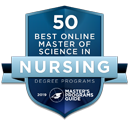

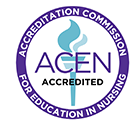

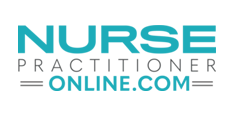
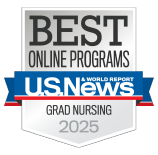
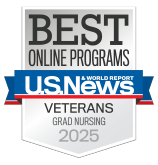
What Can You Do with an Adult Gerontology – Primary Care Nurse Practitioner Degree?
When you hear the words “geriatric” or “gerontology”, you may assume that AGPCNPs only work with elderly patients, but they are in fact able to serve a wide range of patient populations – from adolescents to senior citizens, only excluding infants and children. Each of these patients requires individual, specialized care to keep them well and to ensure that they are making healthy lifestyle choices. With an adult gerontology – primary care NP degree, you can help a large patient population receive the specialized health services they need. Your responsibilities may include:
- Diagnosing and treating illness
- Counseling patients on maintaining a healthy lifestyle
- Coordinating care provided by specialty health care providers
- Providing preventive care, including routine checkups, health-risk assessments, and immunization and screening tests
- Prescribing, ordering, and interpreting diagnostic tests
- Collaborating with other health care providers
- Advocating for underserved individuals and groups
While adult gerontology is a focused area of advanced nursing practice, there are opportunities to specialize even further with additional education and training. Some areas of specialization for AGPCNPs include:
- HIV/AIDS
- Pulmonary care
- Cardiovascular
- Occupational
- Environmental health
- Integrated complementary health care
Where Do Adult Gerontology – Primary Care Nurse Practitioners Work?
Like all nurse practitioners, AGPCNPs are in high demand due to changes in health care law, a growing and aging population, and higher standards in primary care. Adult gerontology – primary care nurse practitioners are especially needed due to their specialized skill set. This means AGPCNPs have many opportunities to apply their skills in a variety of settings, including:
- Hospitals
- Community clinics
- Private medical practices
- Home care agencies
- Physicians’ offices
- Specialty clinics
- Veterans hospitals
- Assisted living facilities
- Rehabilitation centers
- Hospice/palliative care centers
What Is the Typical AGPCNP Salary?
Due to their versatility and the high demand for their services, adult gerontology – primary care nurse practitioners can earn competitive salaries.
According to the latest data from Payscale, the median annual salary for adult gerontology nurse practitioners was approximately $96,200.
Further specialization can affect an AGPCNP’s salary. Some specialties and their median salaries are:
- Diagnosis and treatment planning: $102,000
- Internal medicine: $95,000
- Elder care: $90,000
Adult Gerontology – Primary Care Nurse Practitioner Job Outlook
The job outlook for adult gerontology – primary care nurse practitioners is strong, reflecting projected employment growth for all nurse practitioners. The versatile nature of the care that NPs deliver to patients across medical settings means that, in a rapidly changing health care landscape, AGPCNPs can support quality patient care where and when it’s needed.
According to the U.S. Bureau of Labor Statistics, employment of nurse practitioners is expected to grow 46% between 2021 and 2031, adding nearly 113,000 new jobs. Growing demand for health care services from the nation’s aging population is expected to drive much of this demand.
This projected growth is far greater than that of most other professions, making an MSN with an AGPCNP specialization an educational pursuit with real-world opportunities, bolstered by the fact that only 8.9% of all nurse practitioners specialize in adult gerontology – primary care, according to the American Association of Nurse Practitioners (AANP).
Adult Gerontology - Primary Care NP Careers
Assess, diagnose and plan for the health needs of all adults – from adolescents to seniors.
Gerontology is the study of the aging processes and persons transitioning to later life stages. This field is not to be confused with that of geriatrics, which is the study of health and disease in elderly people. Adult gerontology – primary care nurse practitioners (AGPCNPs or otherwise known as AGNPs) provide primary care to adults, including geriatric patients, and help them manage or overcome various conditions and illnesses.
In addition to the treatment of chronic illnesses, AGPCNPs are often well experienced in polypharmacy management, palliative care, and the provision of services that involve end-of-life considerations. With a primary care focus on patient wellness and promoting healthy choices, AGPCNPs may also manage transitions between care settings and often provide caregiver education and evaluation. Many AGPCNPs work in long-term care settings and clinics throughout the community or may have their own private practice.
AGPCNPs are in demand

AGPCNP responsibilities include:
- Performing physical examinations
- Ordering screening tests
- Interpreting diagnostic tests
- Diagnosing and treating common acute health care problems
- Administering pharmacological and nonpharmacological therapies
- Developing implementing disease prevention and healthy lifestyle plans
- Evaluating the effectiveness of a patient’s treatment plan
- One-on-one health counseling and education
- Coordinating with specialty physicians and other health care providers as needed
Common practice settings include:
- House call practices
- College health centers
- Specialty clinics, such as rheumatology, cardiology, and pulmonary
- Hospices
- Palliative care facilities
- Hospital outpatient clinics
- Rehabilitation centers
- Correctional institutes
- Educational institutions
- Military organizations
Did You Know?*
- The top practice settings for AGPCNPs are hospital outpatient clinics, hospital inpatient units and private group practices.
- The top diagnoses that AGPCNPs treat are anxiety, abdominal pain and hypertension.
- The top clinical focus areas for AGPCNPs are primary care, geriatrics and oncology/hematology.
*AANP
Ready for Your Next Step?
Adult Gerontology Primary Care Nurse Practitioner (AGPCNP) Curriculum
Our curriculum provides a foundational understanding of nursing practice as well as specialization in adult gerontology – primary care, preparing students to enter the field in any of multiple capacities.
Coursework includes:
- Thirteen courses in the core MSN curriculum, including:
- Health Assessment
- Concepts and Challenges in Professional Practice
- Concepts in Nurse Leadership
- Health Policy, Politics, and Perspectives
- Five courses specific to the AGPCNP track, including:
- Political, Financial, and Social Issues in Gerontology
- Clinical Concentration courses and seminars
With robust student support, no GRE requirements, and a flexible learning environment with multiple points of entry, our online Adult Gerontology Primary Care Nurse Practitioner program can help set you on the path to a rewarding career in an in-demand field.
Experience an expertly crafted curriculum taught by our supportive faculty.
Associate Degree in Nursing to MSN
- Associate Degree in Nursing from an accredited nursing program
- Must complete a college-level statistics course prior to the start of classes
- Active unencumbered RN license
- General Education courses may be required, depending on student’s prior undergraduate coursework
Non-Nursing Bachelor’s to MSN
- Bachelor’s degree from a regionally accredited institution of higher education
- Must complete a college-level statistics course prior to the start of classes
- Active unencumbered RN license
- Associate Degree in Nursing (ADN) required.
- Active Registered Nurse (RN) license required.
- General education courses are not required due to prior bachelor’s degree.
Bachelor of Science in Nursing to MSN
- Bachelor’s Degree in Nursing from an accredited nursing program
- Must complete a college-level statistics course prior to the start of classes
- Active unencumbered RN license
Core MSN curriculum includes:
Adult Gerontology (AGPCNP)
Adult Gerontology – Primary Care Nurse Practitioner Admission Requirements
Registered Nurse with Associate Degree Entry or Registered Nurse with Non-Nursing Bachelor’s Degree Entry:
- An Associate Degree in Nursing or a non-nursing bachelor’s degree from a regionally accredited institution of higher education
- Minimum 3.0 cumulative GPA preferred
- Active unencumbered RN license
- Complete 15 bridge credit hours with a B or better
- Must complete a college-level statistics course prior to the start of classes
- For RNs with an Associate Degree in Nursing, general education courses may be required, depending on your prior undergraduate coursework
Registered Nurse with Bachelor of Science in Nursing Degree Entry:
- A Bachelor of Science in Nursing degree from a regionally accredited institution and accredited nursing program
- Minimum 3.0 cumulative GPA preferred
- Active unencumbered RN license
- Must complete a college-level statistics course prior to the start of classes
AGPCNP Application Requirements
You can begin your application process today. To get started you will need to submit the following:
- Application form
- Official transcripts from all post-secondary institutions
- Proof of active unencumbered RN license
- Current resume
- Statement of purpose
- Two letters of recommendation
About Regis

Dr. Antoinette Hays RN, Ph.D.
President
Meet Our Faculty

Deborah M. Jean-Baptiste, PhD, APRN, AGPCNP-BC, CNE
Frequently Asked Questions
Regis is a leading Catholic university in Greater Boston that has been preparing students for success in an evolving, global world since 1927. Our distinguished and personable faculty prepare nurses with a values-based education integrated with cutting-edge technology and industry-focused curriculum in a wide variety of high-demand and niche specializations.
With a focus on holistic patient-centered care, our online MSN program incorporates insider perspectives on the leadership qualities the field demands to help you build the skills you’ll need to positively affect the field.
NPs have greater control over their professional practice and patient outcomes and may benefit from competitive salaries. Many NPs practice independently in some states with prescriptive authority and are being granted more autonomy nationwide.
Additionally, the health care industry is facing a nationwide shortage of physicians and a rising need for primary care, particularly throughout the pandemic. Preparing to become an NP helps nurses hone their skills to deliver the best patient care and outcomes in an industry that continually emphasizes the need to attain ongoing and advanced education.
The program allows three points of entry, providing flexibility to our students:
- RN with Associate Degree (ADN to MSN)
- RN with Non-Nursing Bachelor’s Degree (Bachelor’s to MSN)
- RN with Bachelor of Science in Nursing Degree (BSN to MSN)
Depending on your entry point, you may complete your online MSN degree in as few as:
34 months – RN with Associate Degree (ADN to MSN)
34 months – RN with Non-Nursing Bachelor’s Degree (Bachelor’s to MSN)
26 months – RN with Bachelor of Science in Nursing Degree (BSN to MSN)
*Final curriculum will be decided on individual basis, including potential transfer credits
Depending on your entry point and chosen specialization, the number of credits earned through the online MSN degree may vary:
RN with Associate Degree (ADN to MSN): 54-63 credits/PMHNP 57-66 credits
RN with Non-Nursing Bachelor’s Degree (Bachelor’s to MSN): 54-63 credits/PMHNP 57-66 credits
RN with Bachelor of Science in Nursing Degree (BSN to MSN): 39-48 credits/PMHNP 42-51 credits
Cost Per Credit Hour:
- $1025 per credit hour
Application fee: $75
More information about online graduate nursing program tuition and fees, financial aid, payment options, etc., can be found here.
Yes. You may be eligible to transfer up to 9 graduate credits from regionally accredited institution and accredited program. Three credits each, final grade of a B- or better. Have more questions? Speak with an admissions advisor to learn more.
*Conditions may apply
The online MSN student will typically complete between 664 and 724 hours of clinical practice, depending on your entry point.
Students have an option to space out clinical hours over 2-4 semesters, with approval from the program director.
Regis is proud to offer a 10% tuition discount on fully online programs for employees, members, and spouses of employees of our partner organizations.*
Regis College aims to help military, veterans, and their families to further their education. This is why we offer a 15% tuition discount to all active and reserve military, veterans, and military spouses for our online programs.
We’re also pleased to offer 15% off tuition on online programs to all federal government employees, and their spouses, working in any federal department.
A 10% Alumni discount is available to anyone who has graduated from Regis with a degree, excluding those who only received a certificate from Regis.
Two levels of graduate assistantships are offered at Regis, giving students the unique experience of gaining valuable professional skills while benefiting from financial aid opportunities.**
*Some exceptions apply. The Regis partnership discount cannot be combined with any other discount or scholarship offered by Regis.
**Graduate Assistantships are available to graduate students who are enrolled in a minimum of six credits within their graduate program and maintain a 3.0 GPA.
Online Adult Gerontology – Primary Care Nurse Practitioner Resources

How to Develop and Maintain Social Justice in Nursing
Social justice guides the creation of “social institutions” and the individuals who collaborate with these institutions, according to the Center for Economic and Social Justice.

MSN vs. RN: Similarities and Differences Between MSN and RN Degrees
Both RNs and nurses with an MSN degree work closely with patients, helping to treat illnesses and monitoring health.

The MSN Degree Definition
Hospitals and health care employers are looking for well-educated and qualified nurse professionals to care for patients.

The Importance of Teamwork and Collaboration in Nursing
Nurses must communicate with relevant professionals about their patients’ treatment plan while also understanding the role of each assigned team member.

What Is the Importance of Evidence-Based Practice in Nursing?
EBP enables nurses to make data-backed solutions that incorporate clinical expertise and current research into the decision-making process.

BSN or MSN: Which Is Right for Me?
The nursing discipline features a full range of educational options, including baccalaureate, graduate, and terminal degrees.
Tuition and Fees
$1025
Per credit hour
$100-$300
Estimated cost of textbooks per course
Ways to Save on Your AGPCNP Tuition

Regis partner employees can receive a discount on their tuition. Find out if your employer is a partner.

Federal government employees as well as active and reserve military and veterans are eligible for a 15% discount on tuition.

Regis alumni who have received a previous degree from Regis are eligible for a 10% discount on tuition.

We are here to support you through the process.

Earn financial aid helping fellow students while also gaining valuable professional skills. Get more details.
Related Programs

Pediatric Nurse Practitioner

Family Nurse Practitioner

Psychiatric Mental Health Nurse Practitioner

Adult Gerontology – Acute Care Nurse Practitioner

Online BSN to Doctor of Nursing Practice

Women’s Health Nurse Practitioner
